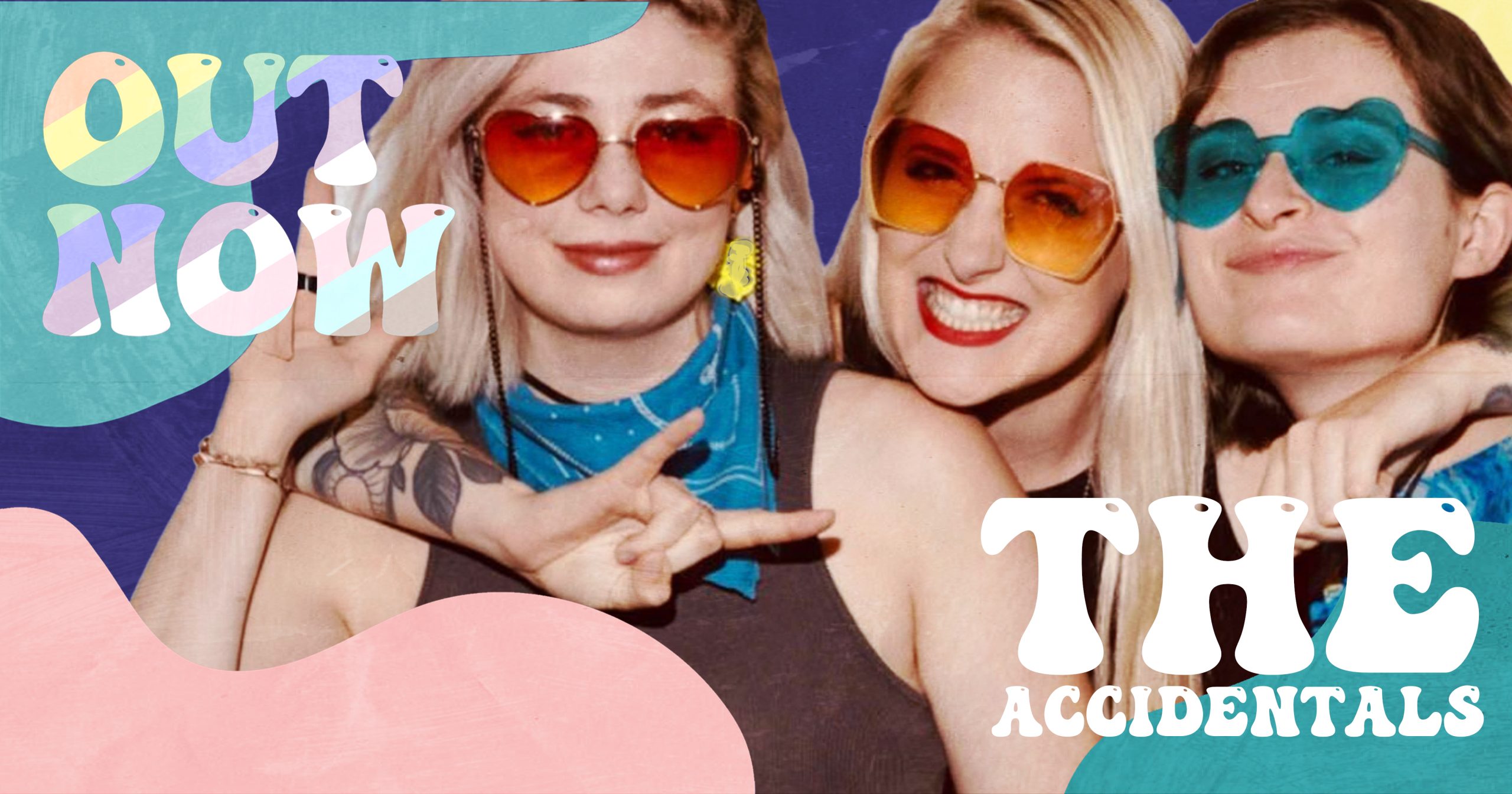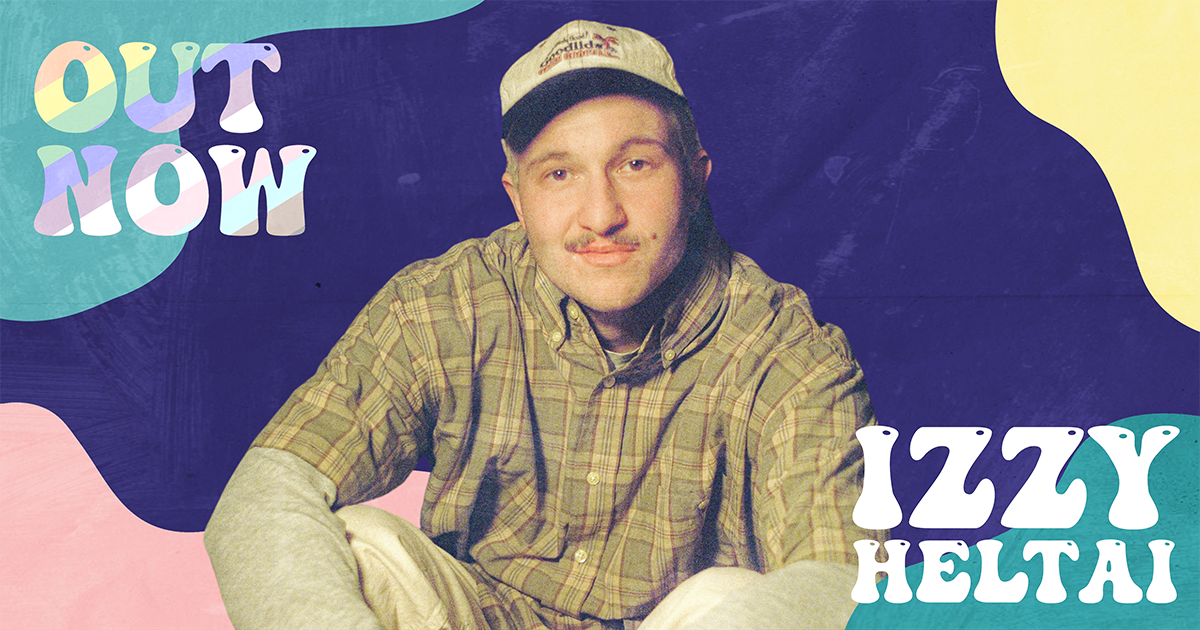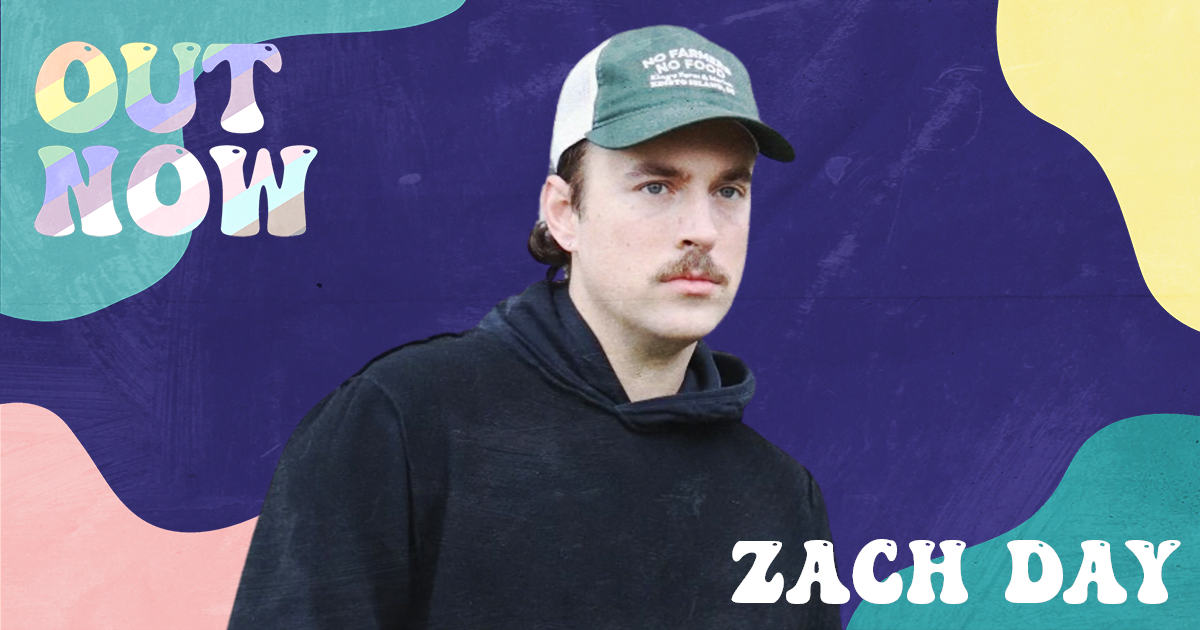Our next band featured on Out Now is the Accidentals, a group that I met over a decade ago, tucked under the oak trees in Northern Michigan at Interlochen Artist Academy. Interlochen is a hub for music and arts education. Katie Larson and Savannah Buist (founders of the band) attended the academy at the same time I did. I’ve admired their artistry and dedication ever since. I remember listening to Interlochen Public Radio, hearing a song they wrote, and thinking these artists were going somewhere. Spoiler alert… they have already gone everywhere, touring all over the U.S.!
Before they attended Interlochen, Katie and Savannah were already playing together in an orchestra and exploring their musical chemistry. The pair are creative, dedicated individuals, curious souls, skilled instrumentalists, and incredible writers. They built a successful career while still very young, touring and playing festival stages in their teenage years. Both turned down college scholarships to hit the road instead. After high school, they added Michael Dause to the band as their percussionist. In 2023, Michael parted from the band; they now play as a trio again with Katelynn Corll.
The Accidentals just released their latest single, “What a Waste.” It’s an honor to highlight this phenomenal band on Out Now. Learn all about their plans for the future, why they create music, and about their incredibly creative minds in our interview with Katie Larson and Savannah Buist.
You’ve been playing together since high school. What has it been like for you to create, write, record, and travel together for the past decade?
Savannah Buist: All of those processes – creating, writing, recording, and traveling – demand different parts of us, and all of them have changed and grown over the years. Creating and writing used to be a more solitary process, and yet [now] we find ourselves collaborating and co-writing with some of the people who inspired us to become songwriters in the first place. Recording went from being solitary, to with producers, to us becoming engineers and recording many of our own projects, to recently joining forces with producer Mary Bragg for a collaborative record. Traveling together used to mean 250 days on the road, sleepless nights living on the opposite schedule of everyone we loved – and now, we ease into it, take our time with it, and the number of people in the van seats, their names and faces have changed over the years.
But the thing that remains true is the constitution of our friendship and our trust. I lean on Katie more than I’ve ever let myself lean on anybody before. She’s the reason why I constantly challenge myself to do better, not just musically but as a person too. She’s a natural listener; she’s observant and deep-thinking. She’s the kind of person who would make an incredible documentary carefully examining both sides of a complex situation and reaching some inevitable core of truth. It’s been incredible watching her grow and change, too, just like all the processes that we engage in together. I think the growth and change I’ve undergone is just as dramatic and important. It’s what keeps us open to each other and supportive of our many interests and endeavors.
Adding Katelynn Corll to the band a couple years ago was like picking up a golden retriever to tour with. She’s always positive and brings balance to the band with her ability to see the big picture, ask good questions, and amp up the energy on stage. She’s got both our backs all the time. It’s a no-ego dream band reality.
Katie Larson: Some days, 10 years sounds like a lifetime and other days it feels like a drop in the bucket. Think about how much change people go through from their late teens to late 20s, then add in the inevitable ups and downs and major transitions you go through in the music industry. What a privilege to have someone by your side who has known your heart since day one. Not only that, but a friend who’s a true collaborator, business partner, and salsa-making science geek who’s always ready to dive into philosophical rabbit holes and will fiercely have your back no matter what. We take a lot of inspiration from the Indigo Girls, a few years ago we got to watch Ann Powers interview them during Americanafest. They’ve been playing music together for almost 40 years now and are still true friends.
Your early success, including playing at various festivals, is impressive. What were some of the most memorable moments or experiences from those early days of touring?
SB: I’ve kept journals for many years and those have sort of fallen into the digital world via Tour Blogs, which we write weekly on our Patreon. Cataloging our experiences has given us a plethora of perspectives. There are times I look back through those journals and blogs and think to myself, “How are we still alive?” From busted trailers to stolen gear to pedalboards lighting on fire from faulty power, playing in caverns and drained swimming pools and stages so tiny we stood shoulder-to-shoulder trying not to poke each others’ eyes out with our bows; farmer’s markets and people’s dogs and their bookshelves when we crashed at their houses, and the strangers who became family along the way. It’s literally too much to recount, because that’s thousands of memories stacked into some neural Jenga of nostalgia. I will say that the early days are like the later days in that we’ve never stopped learning, and never thought we were incapable of learning more.
KL: As an introverted teen, I remember being shocked by kindness from strangers. It still amazes me, but back then it seemed crazy that music could be a catalyst for people making us a home-cooked meal, letting us stay in their homes, or giving us boxes of books to read on the road. One time in the Upper Peninsula of Michigan a man handed us an entire smoked salmon after our set. On another tour in Colorado, we kept accumulating homemade pumpkin bread wherever we went. It wasn’t just gifts – music was also a fast pass to personal conversations with fans at the merch table or with our hosts who became family.
I remember playing a coveted electronic festival called Electric Forest the summer after we graduated high school. Playing folk rock in our dorky dresses (mine covered in pop art chickens and Sav’s covered in cats), we were probably the biggest outlier on the bill, but our artist badges gave us all access. We could go to any stage and watch Lindsey Stirling and Phantogram and Skrillex perform from behind the curtain. In the artist lounge there was this huge juicer, and the women there made me this juice concoction with beets and apple and fresh garlic, and they laughed and said I was glowing. I couldn’t believe we were there.
What was it like for you to start touring and building a career at such a young age?
SB: It was a lot. We thought we were just having fun playing some music with each other and it took on a life of its own. Sometimes in the early years it felt surreal, like a plane taking off and you’re running down the tarmac trying to get on it. I think having a team early was key. We’ve always had the support of our respective parental units – both our moms and dads are musicians and singers and songwriters, so they understood our ambitions and goals and sought tirelessly to lift us up. Having a parent that understands the industry and was willing to support us full time was a lot of the reason we were able to be full-time musicians from a young age.
My mom took us on a brutal “trial tour” in the summer of 2012 – she booked 30 shows in 27 days with radio shows a lot of those mornings, to convince us to go to college. It didn’t work. It just solidified that Katie and I were compatible on the road. At the end of that tour, Katie and I knew we wanted to do this music thing to the extent of both of us [gave] up scholarships to college. My mom agreed to manage/tour with us and we signed our first deal right out of high school. She buffered a lot of the stigma attached to young females playing in clubs they weren’t old enough to be in and took a lot of the verbal abuse that comes with this industry and recording with people you don’t know very well and we watched her handle it.
We learned to start with respect – even when it isn’t mutual – but stand up for ourselves when necessary. We learned to compromise when we could and if we couldn’t live with it, hold our ground. We were made acutely aware of the power of “core base, fans, supporters, road family” and FAMgrove, the fanclub was born. They have kept us going through all the hardest parts.
KL: It was eye opening for a lot of reasons. We had an amazing support system and we were eager to learn and become better musicians. A lot of artists and people in the industry took us under their wing and I learned so many life lessons from those who treated us with mutual respect. There were times when people assumed we put ourselves on a pedestal and didn’t know how to use our gear or hold our own, because we were young. We learned quickly that being alone in the wrong place at the wrong time could be very dangerous and relied on our tour family to keep each other safe. Contradictions can be true. I think touring made us more independent, and also more dependent on each other. It made us more self confident, and more self-conscious.
You founded a nonprofit organization, Play It Forward, Again and Again, to empower youth and provide better access to instruments, lessons, and mentors. What led you to that kind of work, and do you have plans and hopes to continue? What is your vision?
SB: We do a lot of workshops for kids all over the country – songwriting workshops, improvisational workshops, alternative styles for strings workshops. When we were in high school, a duo called the Moxie Strings came to our school and did a performance playing electric violin and cello. That was so monumental to us; it showed us that it was possible to take those instruments to a contemporary world and succeed and it also showed us that there were women out there making it happen. We started doing workshops for exactly that reason – to perpetuate that cycle of inspiration and encouragement; to allow people of any background to have the opportunity to express themselves via music.
It’s hard to do that when budgets for music programs are typically the first to get slashed. Many schools we traveled to had only a choir or a band program, if any program existed at all. The underprivileged areas we visited often contained extremely talented kids who were naturally gifted, but lacked access to the tools due to financial constraints. Instruments can be incredibly expensive, especially in the orchestral world, and it keeps them from being accessible to kids who could use them for therapeutic purposes, who could change the world with them.
So, that led to us establishing a nonprofit with the goal to get instruments into those kids’ hands. Not only that, but we want to establish a support system for them to get follow-up lessons from a musician local to their area. This allows them not just the tools for self-expression, but also instruction on how to use those tools, too. We wanna connect schools with bands that are touring through and provide funding for the band and school to show kids that it’s possible to make a living doing something you love.
For anyone reading this who might not be out of the closet, were there any specific people, musicians, or resources that helped you find yourself as a queer individual?
KL: I’m still figuring out where I identify on the LGBTQ+ spectrum, so one of the most helpful things for me is to talk to friends about their experiences. It allows me to sort through things I resonate with and gives me a safe space for self-reflection. I’m not always the best communicator, but since I was a kid I always thought I had a good understanding of myself. That makes it hard for me to acknowledge that there are still parts of myself I’m learning about. It helps to hear other people I admire doing the same thing at various points in their life. These are a couple articles I’ve read that come to mind: Lucy Dacus on coming out and Amelia Meath of Sylvan Esso talking about her identity.
Who are your favorite LGBTQ+ artists and bands?
SB: I think it’s important to clarify that many artists and bands have LGBTQ+ members without being an “LGBTQ-themed” band, per se. It’s hard for me to definitively know if a band with LGBTQ+ members or an artist who lies somewhere on the LGBTQ+ spectrum wants to be considered an LGBTQ+ artist or band, unless they’re specifically writing songs about their queerness – otherwise it leads to assumptions that I don’t think it’s my place to make.
I think identification can be both empowering and entrapping. We contain multitudes and we are so much more than who we love. It’s a big reason why I don’t always talk about my queerness. That being said, there is an important aspect to identifying with your queerness and resonating with it that creates a safety net for others to be themselves and I am all about that kind of inclusion.
There are artists of the LGBTQ+ community paving the way for inclusivity every day: Ani DiFranco and Brandi Carlile were the firsts for me, then I had a writing session with Maia Sharp and it opened up my world. She was the first person to tell me that I was OK. Then I met Crys Matthews, Heather Mae, Ethel Cain, Spencer LaJoye, and I felt safer talking about it. There is space for queer artists to create art about their queerness and queerness as a whole, and there’s also space for queer artists to create art that’s not about their queerness, at least to themselves. My favorite LGBTQ+ artists and bands write all kinds of music, while staying true to themselves – whether they are out of the closet or still deciding how to verbalize how they feel.
What is your ideal vision for your future?
SB: We made a pie chart at the beginning of ’24 and we each decided how much time we wanted to give to each project. My ideal vision for the future is balance. Right now I’m feeling pretty good about playing as a side artist with Lainey Wilson and still sitting in with artists like Ashley McBryde, Hannah Wicklund, Beth Nielsen Chapman, and Kim Richey. Katie and I played strings (and other instruments) and sang on 40+ other albums this year and we loved that. So we’re always down for more session work.
The Accidentals are touring less in ’25 to make room for other projects and that was the plan that came out of the pie chart conversation. We’ll put out a couple albums in ’25 that we’ve been working on for two years, a TIME OUT 3 album (first single just dropped), a children’s album written with Tom Paxton, and a Christmas album with Kaboom Collective Studio Orchestra. We’ll tour those albums, but not much aside from that. We’re also looking at a “Michigan and Again” children’s book deal.
As far as long term, I’m one semester away from my bachelor’s in biology so I’ll likely finish that when time allows. The takeaway from all that is we are in love with the process, the learning, the growing, the becoming. We find gratitude everyday for the opportunity to explore all those things and become the best version of ourselves.
Photo Credit: Jay Gilbert


